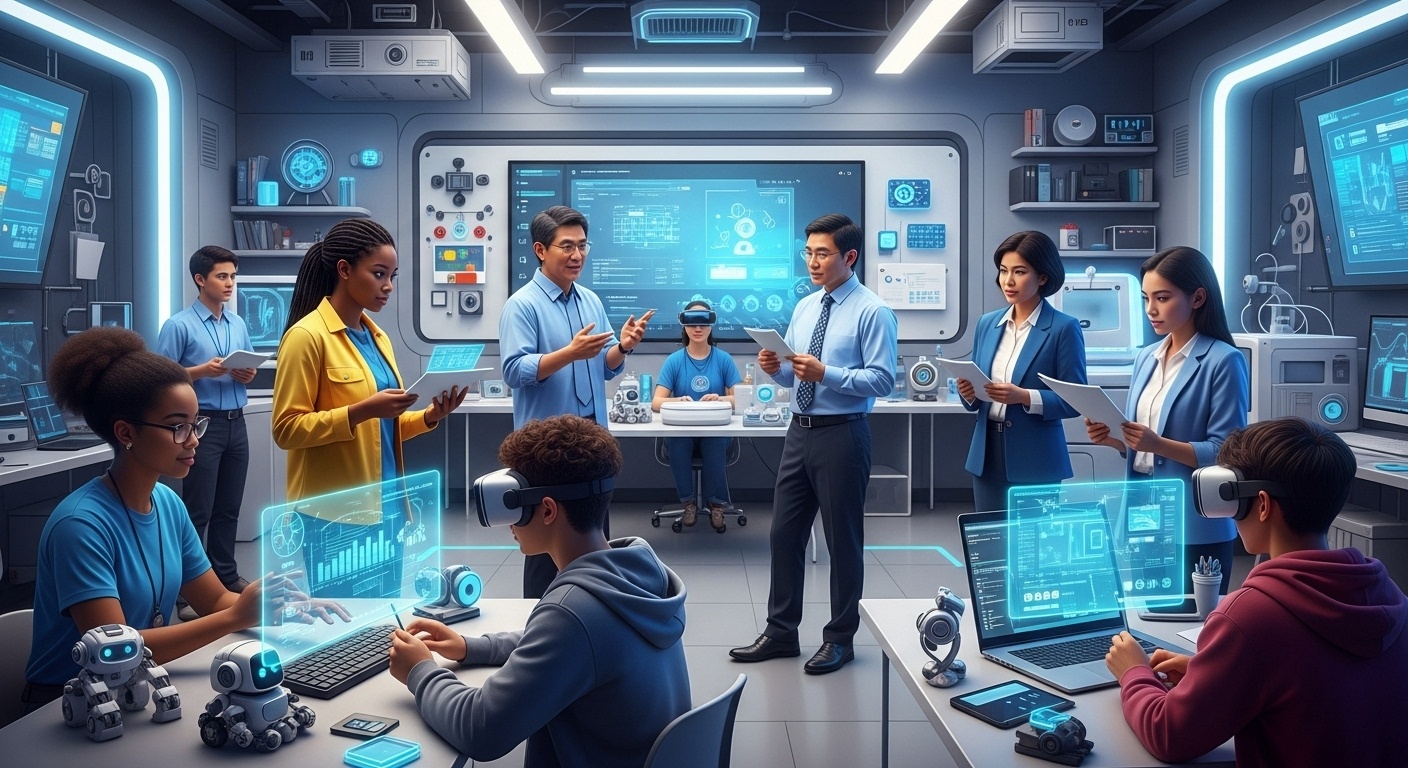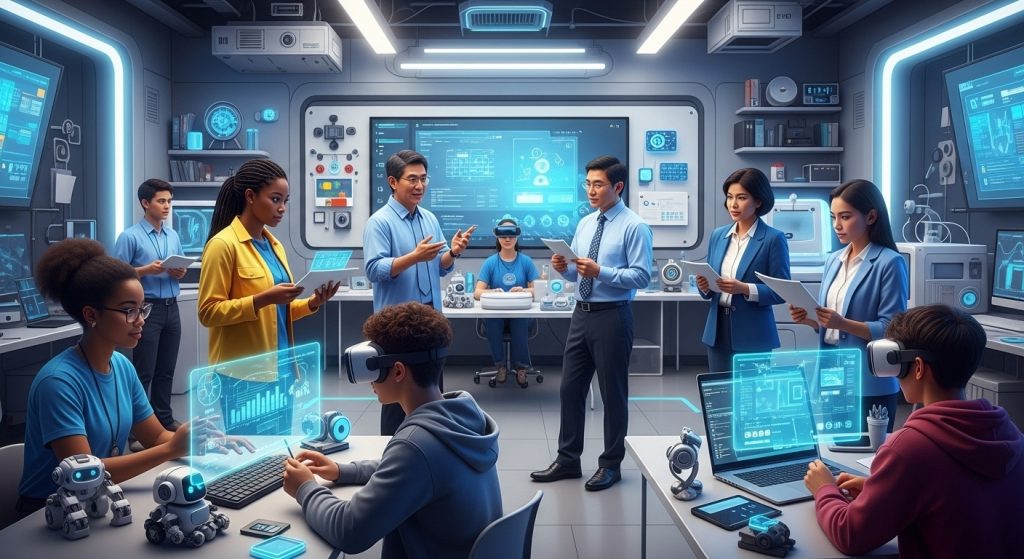Imagine architecting the next generation of AI-powered healthcare solutions or developing the cybersecurity protocols that safeguard billions of financial transactions daily. These aren’t futuristic fantasies; they’re the realities shaping computer science careers in 2025. The demand for skilled professionals is surging, fueled by advancements in areas like quantum computing and decentralized technologies. We’ll delve into specific roles, from Machine Learning Engineers commanding impressive salaries to Data Scientists interpreting complex datasets. We will also explore paths into burgeoning fields like blockchain development, focusing on projected compensation and essential skillsets. Prepare to navigate the landscape of opportunities and equip yourself with the knowledge to make informed career choices in this dynamic sector.

Decoding the Computer Science Landscape: A Glimpse into 2025
The field of computer science is in constant flux, driven by relentless technological innovation. As we approach 2025, understanding the evolving career paths and potential earning power within this domain is crucial for aspiring professionals and those considering a career change. Let’s delve into the key areas shaping the future of computer science careers.
Software Development: The Foundation and Beyond
Software development remains a cornerstone of computer science. It encompasses a vast range of specializations, each with unique demands and opportunities. A software developer is responsible for designing, developing, testing. Maintaining software applications. Here’s a breakdown of some popular roles:
- Front-End Developers: Craft the user interface (UI) and user experience (UX) of websites and applications. Proficiency in HTML, CSS, JavaScript. Frameworks like React, Angular, or Vue. Js is essential.
- Back-End Developers: Focus on the server-side logic, databases. APIs that power applications. Expertise in languages like Python, Java, Node. Js. Databases like MySQL, PostgreSQL, or MongoDB is key.
- Full-Stack Developers: Possess skills in both front-end and back-end development, offering versatility and a holistic understanding of the software development process.
- Mobile App Developers: Create applications for mobile platforms like iOS (Swift/Objective-C) and Android (Java/Kotlin).
- Game Developers: Design and develop video games using game engines like Unity or Unreal Engine and programming languages like C++ or C#.
Salary Expectations (2025): Entry-level positions can range from $70,000 to $90,000 annually, while experienced developers with 5+ years of experience can earn upwards of $120,000 to $180,000 or more, depending on location, skills. Company size. Specializations like AI/ML or blockchain development often command higher salaries.
Data Science and Analytics: Taming the Data Deluge
Data is the new oil. Data scientists are the skilled engineers who extract, refine. Review it. This field involves collecting, cleaning. Interpreting large datasets to uncover insights and make data-driven decisions. Key roles include:
- Data Scientists: Apply statistical analysis, machine learning algorithms. Data visualization techniques to solve complex problems. Proficiency in Python or R, along with libraries like scikit-learn, TensorFlow, or PyTorch, is crucial.
- Data Analysts: Focus on analyzing existing data to identify trends, patterns. Insights that can inform business strategies. Skills in SQL, Excel. Data visualization tools like Tableau or Power BI are essential.
- Machine Learning Engineers: Develop and deploy machine learning models to automate tasks, predict outcomes. Improve decision-making. They often work closely with data scientists and software engineers.
- Business Intelligence (BI) Analysts: Translate data into actionable insights for business stakeholders, using dashboards and reports to track key performance indicators (KPIs).
Salary Expectations (2025): Entry-level data analysts can expect salaries ranging from $65,000 to $85,000 per year. Data scientists and machine learning engineers, with their specialized skills, can command salaries from $90,000 to $150,000+ for entry-level positions. Experienced professionals can easily exceed $200,000 annually.
Cybersecurity: Protecting the Digital Realm
As our reliance on technology grows, so does the need for robust cybersecurity measures. Cybersecurity professionals are responsible for protecting computer systems, networks. Data from unauthorized access, theft. Damage. Crucial roles include:
- Security Analysts: Monitor systems for security breaches, investigate incidents. Implement security measures to prevent future attacks.
- Penetration Testers (Ethical Hackers): Simulate real-world attacks to identify vulnerabilities in systems and networks.
- Security Engineers: Design, implement. Maintain security infrastructure, including firewalls, intrusion detection systems. Encryption technologies.
- Security Architects: Develop and implement security strategies and policies for organizations, ensuring compliance with industry regulations.
Salary Expectations (2025): Entry-level security analysts typically earn between $70,000 and $95,000 per year. Experienced security engineers and architects can command salaries ranging from $120,000 to $200,000+ annually, particularly those with specialized certifications like CISSP or CISM.
Cloud Computing: The Infrastructure of the Future
Cloud computing has revolutionized the way businesses operate, providing on-demand access to computing resources, storage. Applications. Cloud professionals are in high demand, with roles such as:
- Cloud Architects: Design and implement cloud infrastructure solutions, ensuring scalability, security. Cost-effectiveness.
- Cloud Engineers: Deploy, manage. Maintain cloud-based systems and applications.
- DevOps Engineers: Automate the software development and deployment process, bridging the gap between development and operations teams.
Salary Expectations (2025): Cloud engineers and architects can expect starting salaries between $80,000 and $110,000 per year. Experienced professionals with expertise in platforms like AWS, Azure, or Google Cloud can earn upwards of $150,000 to $250,000+ annually.
Artificial Intelligence (AI) and Machine Learning (ML): The Rise of Intelligent Systems
AI and ML are transforming industries across the board, enabling machines to learn, reason. Solve problems like humans. This rapidly growing field offers exciting career opportunities:
- AI/ML Engineers: Develop and deploy AI/ML models for various applications, such as natural language processing, computer vision. Predictive analytics.
- AI/ML Researchers: Conduct research to advance the state of the art in AI/ML, exploring new algorithms and techniques.
- Data Scientists (AI/ML Focus): Apply AI/ML techniques to assess data and extract insights, often working on specific applications like fraud detection or personalized recommendations.
Salary Expectations (2025): Due to the high demand and specialized skills required, AI/ML professionals command some of the highest salaries in the computer science field. Entry-level AI/ML engineers can expect salaries ranging from $100,000 to $160,000 per year, while experienced professionals can easily exceed $200,000 or even $300,000+ annually, especially in competitive markets.
Blockchain Development: The Decentralized Revolution
Blockchain technology, the foundation of cryptocurrencies like Bitcoin, is finding applications in various industries, from finance to supply chain management. Blockchain developers are responsible for building and maintaining decentralized applications (dApps) and blockchain-based systems. The demand for these skills is increasing, particularly in the fintech sector.
Salary Expectations (2025): Blockchain developers are in high demand and can command competitive salaries. Entry-level positions typically range from $80,000 to $120,000 per year, while experienced developers can earn upwards of $150,000 to $200,000+ depending on their expertise and the complexity of the projects they work on.
Comparing Career Paths: Skills, Demand. Growth
Choosing the right career path within computer science requires careful consideration of your interests, skills. The current market trends. Here’s a comparative overview of the key areas discussed:
| Career Path | Key Skills | Demand (2025) | Growth Potential | Salary Expectations (Experienced) |
|---|---|---|---|---|
| Software Development | Programming languages, data structures, algorithms, software design principles | High | Stable, with continued specialization | $120,000 – $180,000+ |
| Data Science & Analytics | Statistical analysis, machine learning, data visualization, programming (Python/R) | Very High | Rapid growth, especially in AI/ML | $150,000 – $250,000+ |
| Cybersecurity | Network security, ethical hacking, security architecture, incident response | High | Strong growth due to increasing cyber threats | $120,000 – $200,000+ |
| Cloud Computing | Cloud platforms (AWS, Azure, GCP), DevOps, infrastructure as code | Very High | Significant growth as businesses migrate to the cloud | $150,000 – $250,000+ |
| AI/ML | Machine learning algorithms, deep learning, neural networks, programming (Python) | Extremely High | Exponential growth, driven by AI adoption across industries | $200,000 – $300,000+ |
| Blockchain Development | Cryptography, distributed systems, smart contracts, blockchain platforms | High | Growing, driven by adoption in finance and other sectors | $150,000 – $200,000+ |
The Role of Education: Computer Science Colleges and Beyond
A solid foundation in computer science is essential for success in any of these career paths. While a bachelor’s degree in computer science is often the standard entry point, further education, such as a master’s degree or specialized certifications, can significantly enhance your career prospects and earning potential. Choosing the right computer science colleges that offer programs aligned with your career goals is crucial. Many online resources and bootcamps also provide valuable skills and training in specific areas like web development, data science, or cybersecurity.
Staying Ahead of the Curve: Continuous Learning and Adaptation
The field of computer science is constantly evolving, so continuous learning is essential. This includes:
- Staying updated on the latest technologies and trends: Read industry publications, attend conferences. Participate in online communities.
- Developing new skills: Take online courses, attend workshops. Work on personal projects to expand your skill set.
- Networking with other professionals: Connect with peers, mentors. Industry leaders to learn from their experiences and build relationships.
Real-World Applications and Examples
To illustrate the impact of these computer science careers, consider the following examples:
- Software Developers: Building the next generation of e-commerce platforms, social media networks, or mobile games. Companies like Amazon, Facebook. Google rely heavily on software developers.
- Data Scientists: Helping healthcare providers predict patient outcomes, enabling financial institutions to detect fraud, or optimizing marketing campaigns for businesses.
- Cybersecurity Professionals: Protecting critical infrastructure from cyberattacks, securing sensitive data for government agencies, or helping businesses comply with data privacy regulations.
- Cloud Computing Experts: Enabling businesses to scale their operations, reduce IT costs. Improve agility. Companies like Netflix and Spotify rely on cloud infrastructure.
- AI/ML Engineers: Developing self-driving cars, creating personalized recommendations for online shoppers, or automating customer service interactions.
The Future is Code: Final Thoughts
Computer science offers a wealth of exciting and rewarding career opportunities. By understanding the different paths available, developing the necessary skills. Staying ahead of the curve, you can position yourself for success in this dynamic and ever-evolving field. The demand for skilled computer science professionals will only continue to grow in the coming years, making it a promising career choice for those with a passion for technology and problem-solving.
Conclusion
The landscape of computer science careers in 2025 is brimming with opportunity. Success demands proactivity. Don’t passively wait for the perfect role; actively cultivate your skills in emerging areas like AI ethics and sustainable computing – fields I’ve personally seen explode in demand at recent tech conferences. Remember, salary expectations are just starting points; your true earning potential lies in your ability to adapt and innovate. My advice? Start a personal project demonstrating your abilities in a cutting-edge technology; it speaks volumes louder than a resume. Embrace the challenge, stay curious. Build the future you want to see. The code to your success is waiting to be written.
More Articles
Navigating German University Applications: A Simple Step-by-Step Guide
Top Engineering Universities in Germany: Your 2025 Degree Guide
Unlock Funding: Essential Guide to Scholarships for International Students in Germany
Budget-Friendly Guide: What is the Real Cost of Living in Germany?
FAQs
So, I’m thinking about computer science. What are some actual career paths I could take, like beyond just ‘programmer’?
Totally! ‘Programmer’ is just the tip of the iceberg. Think about Cybersecurity Analyst protecting systems from hackers, Data Scientist mining insights from massive datasets, Software Engineer building the next big app, or even a UX/UI Designer crafting user-friendly interfaces. You could also go into fields like AI/Machine Learning engineering, cloud computing, or even video game development! It’s a really diverse field.
What kind of salary can I realistically expect in 2025 as a fresh graduate in CS?
Okay, this varies a LOT based on location, skills. Company. But generally, expect a starting salary somewhere in the range of $70,000 to $110,000 in many parts of the US. Highly sought-after skills like AI/ML or cloud computing could push that even higher. Research specific roles and locations you’re interested in on sites like Glassdoor or Levels. Fyi for the most up-to-date info.
Is a computer science degree absolutely necessary to get a good job in the field?
While a CS degree is definitely the most common and often preferred route, it’s not the only one. Bootcamps, online courses. Self-teaching can also get you there, especially if you build a strong portfolio of projects to demonstrate your skills. Some companies are increasingly open to candidates with non-traditional backgrounds. You’ll need to prove you have the chops.
What are some of the ‘hot’ skills I should be focusing on learning right now to make myself more employable in 2025?
Good question! Definitely dive into cloud computing (AWS, Azure, Google Cloud), artificial intelligence and machine learning (Python, TensorFlow, PyTorch), cybersecurity principles. Data analysis skills. Staying sharp with common languages like Python, Java. JavaScript is also crucial. Don’t forget about DevOps practices – automation is king!
I’m not sure what part of computer science interests me most. How do I figure that out?
Experiment! Take introductory courses in different areas, like web development, data science, or cybersecurity. Participate in hackathons or personal projects to get hands-on experience. Network with people working in different roles to learn about their day-to-day activities. Internships are fantastic for exploring specific areas and seeing if they’re a good fit.
Will AI actually take all the CS jobs?
That’s the million-dollar question, isn’t it? While AI will automate some tasks and change the nature of certain roles, it’s more likely to create new opportunities than eliminate all the jobs. The demand for people who can build, maintain. Ethically manage AI systems is going to be huge. So, focus on developing skills that complement AI, like critical thinking, problem-solving. Creativity.
Besides the salary, what are some other perks or benefits I can expect in a computer science career?
Beyond the paycheck (which, let’s be honest, is a pretty good perk!) , many tech companies offer things like flexible work arrangements (remote work or hybrid models), generous vacation time, comprehensive health insurance, stock options or equity, professional development opportunities (training, conferences). Fun perks like catered lunches, game rooms, or company retreats. The exact benefits vary widely. They’re often a big draw!



